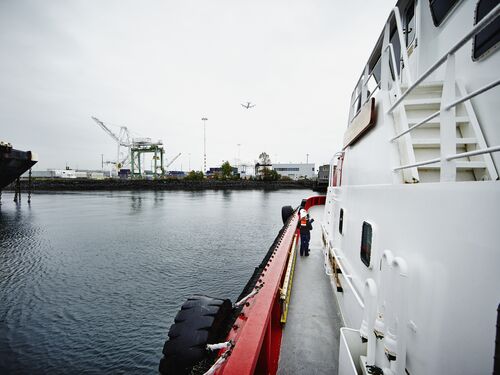New $50 Million Challenge Launched to Support a Safer, More Resilient, and Sustainable Future for the U.S. Gulf Coast Region
News Release
By Pete Nelson and Josh Blatt
Last update June 18, 2024
WASHINGTON — The National Academies of Sciences, Engineering, and Medicine’s Gulf Research Program today launched the Gulf Futures Challenge, a $50 million open competition designed to discover and invest in bold ideas that address critical challenges in the Gulf of Mexico region through the application, translation, or communication of science, engineering, and medical knowledge.
The competition is seeking innovative solutions at the intersection of three futures: the future of the energy transition; the future of environmental change along the coast; and the future of healthy and resilient communities. Up to 10 finalists will receive as much as $1 million in project development support and technical assistance to strengthen their proposals. Two of the finalists will be selected to receive awards of $20 million each to implement their solutions. This is the largest grant opportunity announced in the 11 years of the Gulf Research Program.
“The smart application of scientific, engineering, and medical knowledge is essential for ensuring productivity, health, and sustainability for the communities and critical ecosystems of the Gulf Coast,” said Marcia McNutt, president of the National Academy of Sciences. “We are proud to support this challenge, which is tapping into the Gulf’s most valuable resource — the knowledge, creativity, and passion of the people who call it home.”
The Gulf Futures Challenge seeks to leverage the inherent talent and knowledge of people from the Gulf area by supporting ideas and solutions from those who understand the region best. At its foundation, the competition aims to discover and promote experimentation and new ideas that could result in transformational solutions and impacts.
“Challenges like this provide a unique way to surface and support truly innovative ideas and collaborations,” said Lauren Alexander Augustine, executive director of the Gulf Research Program. “The approach we’re taking here is at the cutting edge of philanthropy, and the GRP is looking forward to the creative and transformative solutions that will emerge.”
Nonprofits, local governments, and academic institutions are eligible to participate as lead organizations, with partnerships and collaborations encouraged. Lead organizations must be based in the Gulf region, encompassing Alabama, Florida, Louisiana, Mississippi, and/or Texas, and proposed projects should occur within 100 miles of the Gulf coastline. Proposals should bridge knowledge to action, to produce, inclusive, innovative, and transformative solutions to the key challenges facing the Gulf region.
The Gulf Futures Challenge is being managed by Lever for Change, a nonprofit affiliate of the John D. and Catherine T. MacArthur Foundation that leverages its networks to help donors find and fund bold solutions to the world’s biggest problems.
Interested applicants are invited to visit https://gulf-futures-challenge.nationalacademies.org/ for more information and take the Organizational Readiness Tool assessment to determine eligibility. Applicants must register to apply by Aug. 20, 2024, at 5 p.m. EDT. Once registered, applicants must submit an online application by Sept. 20, 2024, at 5 p.m. EDT.
The National Academies’ Gulf Research Program is an independent, science-based program founded in 2013 as part of legal settlements with the companies involved in the 2010 Deepwater Horizon disaster. It seeks to enhance offshore energy system safety and protect human health and the environment by catalyzing advances in science, practice, and capacity to generate long-term benefits for the Gulf of Mexico region and the nation. The program has $500 million for use over 30 years to fund grants, fellowships, and other activities in the areas of research and development, education and training, and monitoring and synthesis. Visit nationalacademies.org/gulf/gulf-research-program to learn more.
The National Academies of Sciences, Engineering, and Medicine are private, nonprofit institutions that provide independent, objective analysis and advice to the nation to solve complex problems and inform public policy decisions related to science, engineering, and medicine. They operate under an 1863 congressional charter to the National Academy of Sciences, signed by President Lincoln.
Contacts:
Pete Nelson, Director of Communications
Gulf Research Program
email PNelson@nas.edu
Josh Blatt, Media Relations Officer
Office of News and Public Information
202-334-2138; email news@nas.edu
More like this
Discover
Events
Right Now & Next Up
Stay in the loop with can’t-miss sessions, live events, and activities happening over the next two days.
NAS Building Guided Tours Available!
Participate in a one-hour guided tour of the historic National Academy of Sciences building, highlighting its distinctive architecture, renowned artwork, and the intersection of art, science, and culture.


